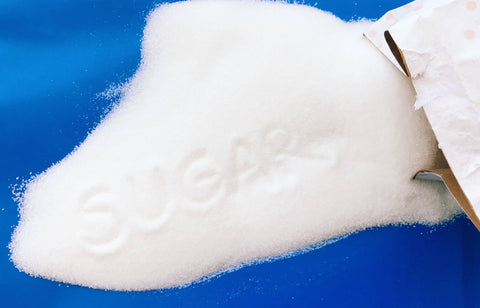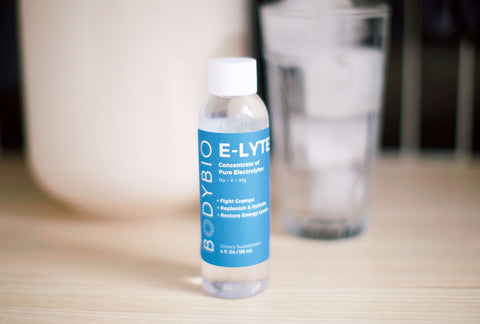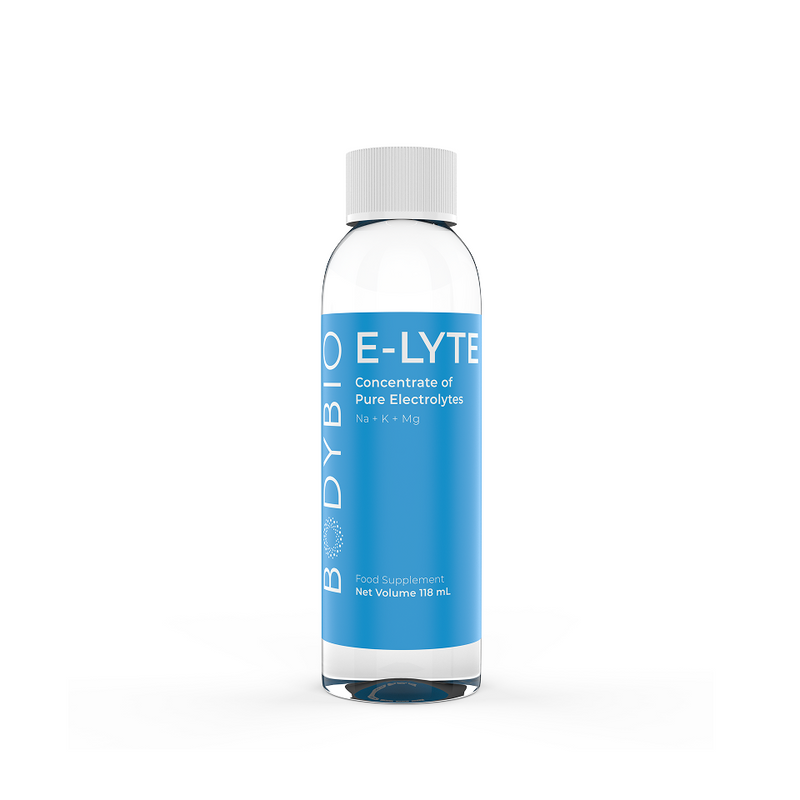What are Electrolytes? How to Maintain the Proper Balance
Key Takeaways:
KEY POINTS:
- Electrolytes are essential minerals your cells need to facilitate conduct electricity and energize reactions throughout the body, including muscle contractions, fluid balance, nerve impulses, and more.
- Key electrolyes include sodium, potassium, magnesium, chloride, and calcium. They work in tight balance with each other, so it’s important to make sure they function in the correct ratios.
- While sports drinks might be popular, they’re a much better source of sugar than electrolytes. BodyBio E-Lyte contains only pure, salty, refreshing electrolytes in the optimal concentration for your cellular function.
Do you ever wonder what electrolytes are and why they are so important for your body? Growing up, you can probably recall seeing the Gatorade logo on every sports field and drinking it without thinking much about electrolyte levels.
For most, that neon drink was synonymous simply with hydration and physical exertion. Fortunately, science and nutrition have caught up and we now know that the sugary concoction we all chugged down to rehydrate after the big game may have been doing us more harm than good.
When it comes to maintaining our body's essential functions and achieving peak performance, few elements play as pivotal a role as electrolytes. In this blog post, we'll delve into the world of electrolytes, exploring what they are, the vital functions they perform, and the myriad benefits they offer for our overall health.
Table of Contents
- What are Electrolytes?
- Sources of Electrolytes
- Benefits of Electrolytes
- Electrolyte Imbalances
- Foods with Electrolytes
- The Problem with Today’s Electrolyte Drinks
- E-Lyte: Electrolytes Elevated
What are Electrolytes?
Electrolytes are minerals in your body that carry an electric charge. They are crucial for various bodily functions, including regulating fluid balance, transmitting nerve impulses, and maintaining proper muscle function.
From sodium and potassium to calcium and magnesium, a proper balance of electrolytes is key to maintaining good overall health. Imbalances in electrolytes can lead to symptoms such as muscle cramps, fatigue, and even more severe complications.
Sources of Electrolytes
Although we don’t talk about them much, electrolytes play a plethora of roles in the body. These tiny particles of minerals carry electrical charges and are present in all body fluids including our blood, plasma, and urine. We need electrolyte replacement when we get sick with a common illness, or something more serious like cancer or kidney disease. In daily life, extreme exercise and physical exertion also call for extra electrolytes.
Electrolytes play a vital role in our body’s most important processes. The key essential electrolytes to know are:
- Sodium
- Potassium
- Calcium
- Phosphate
- Magnesium
What do each of these essential nutrients do and why do they need to be balanced? Let’s dive deeper into the natural sources of electrolytes.
Sodium
We need sodium to maintain normal blood pressure while also sending electrical messages to start a muscle contraction. Too much or too little salt can be problematic. For instance, if you drink too much plain water during intense exercise, especially in hot weather, you may become nauseous, disoriented, and experience vomiting.
Why? Because your cells are quite literally drying out from lack of sodium, and your kidneys begin to conserve water so you don’t urinate. This is why getting the perfect balance through optimal hydration is very important.
Potassium
Potassium is another essential electrolyte. Living inside the cell, it controls water and pH balance while helping to relax muscle contractions and to regulate heartbeat. Potassium deficiency is common among the elderly, who are more apt to suffer chronic disease and to take medications that deplete this mineral.
Chloride
Found in extracellular liquid, chloride, in the company of sodium (as found in table salt), helps to maintain proper fluid balance and pressure of the various fluid compartments. Sodium and chloride together are essential electrolytes for various physiological processes, including nerve and muscle function, acid-base balance, and fluid regulation. Low chloride levels may be a sign of heart failure, high blood pressure, or lung disease, so it’s important to discuss any concerns with your doctor.
Calcium
Calcium is involved in the contraction of cardiac and smooth muscle, but also supports blood clotting, maintains cell membrane permeability, and helps transmit nerve impulses. Calcium also supports strong teeth and bones, along with phosphorus. Most electrolyte products don’t contain calcium, because we get a lot of calcium from foods or supplementations. Too much calcium can cause vascular issues.
Magnesium
Last but not least, magnesium, like potassium, is found inside the cell. Not only is magnesium a constituent of over three hundred biochemical reactions in the body, but it also plays a role in synthesizing both RNA and DNA. It affects muscle function, energy production, carbohydrate, and protein metabolism. Around half the U.S. population is deficient in this critical mineral.
Magnesium is a relaxant, so taking too much can cause lethargy, but too little can create symptoms such as muscle weakness, tremors, and dizziness — and in the worst cases may lead to cardiac arrhythmia.
Benefits of Electrolytes
Now that we understand the critical role that electrolytes play in the body — you may wonder, but do I need to supplement them? Yes! We all do, and sometimes extra support is necessary to maintain ideal health.
Electrolytes play a crucial role in maintaining several of the most vital functions in the human body. Some of the key benefits of electrolytes include:
- Maintaining Fluid Balance: Electrolytes help regulate the balance of fluids in and around your cells, ensuring that your body maintains the right amount of water in various compartments. This is essential for overall health and cellular function.
- Muscle Function: Calcium, sodium, and potassium are crucial for muscle function, including muscle contractions and relaxation. Adequate levels of these electrolytes are essential for physical performance and the prevention of muscle cramps and weakness.
- Nervous System Function: Electrolytes such as sodium, potassium, and calcium are essential for transmitting nerve impulses. This allows nerve cells to transmit signals throughout your body, including those that stimulate muscle contractions and sensory perception.
- PH Levels: Electrolytes also contribute to maintaining the body's acid-base balance, aka pH balance. They help keep the pH level of your blood and bodily fluids within a narrow, healthy range.
Electrolyte Imbalances
An electrolyte imbalance occurs when there is an irregular concentration of electrolytes in the body, disrupting normal electrical activity in cells and tissues. When electrolyte levels are imbalanced, either too high or too low, it can lead to a range of symptoms and health issues.
Some of the most common causes of electrolyte imbalances include:
- Dehydration: Inadequate fluid intake, vomiting, or diarrhea can lead to dehydration, resulting in imbalances in electrolytes like sodium and potassium.
- Diet: An unbalanced diet that is either very low or very high in certain electrolytes can lead to imbalances. For example, consuming too much salt (sodium) can result in high sodium levels (hypernatremia), which also throws off potassium levels.
- Excessive Alcohol Consumption: Alcohol can lead to dehydration and disrupt electrolyte balance, particularly magnesium and potassium.
- Sweating: Intense physical activity or sweating a lot without adequate fluid and electrolyte replacement can lead to imbalances, particularly in sodium and potassium.
Diagnosing Electrolyte Imbalances
Whether low or high, it's important to recognize and address the underlying cause of an electrolyte imbalance to prevent associated health issues. Electrolyte imbalances can be diagnosed through blood tests, hair mineral testing, and consultation with your doctor. Typically, treatment involves correcting the underlying root cause, modifying diet or medication regimens, and, in some cases, receiving intravenous electrolyte replacement. If you suspect an electrolyte imbalance, it's essential to consult a healthcare professional for proper evaluation and management.
What Happens When Your Body is Low on Electrolytes?
When the body is low on electrolytes, it can lead to various physiological imbalances and disruptions in normal bodily functions. For example, when sodium levels drop below normal, it can result in symptoms such as muscle cramps, fatigue, headache, and confusion. When calcium levels are low, individuals may experience symptoms such as muscle cramps, numbness or tingling in the fingers and toes, and weakened bones.
Foods With Electrolytes
While most people associate electrolytes with sports hydration drinks, there are several common foods that are rich in these essential minerals and contain natural electrolytes. Remember that while these foods are great sources of electrolytes, they should be consumed as part of a balanced diet.
- Sodium: Table salt, pickles, celery, and beets.
- Potassium: Bananas, oranges, spinach, and tomatoes.
- Chloride: Seaweed, olives, tomatoes, and lettuce.
- Calcium: Dairy products, kale, almonds, and salmon.
- Magnesium: Cashews, avocados, whole grains, and dark chocolate.
The Problem with Today’s Electrolyte Drinks

One of the primary problems with most electrolyte and hydration drinks on the market today is the amount of sugar per serving. Think back to our Gatorade example at the beginning of this article. A 20-ounce Gatorade contains 26 grams of sugar — that’s just slightly less than a bottle of soda. Sugar is also a carbohydrate that hinders the body's ability to process a hydration drink because it slows absorption.
We know that too much processed sugar can have negative effects on our health, but you may not know that sugar also affects electrolyte balance. Sports drinks containing sugar elevate insulin as part of the metabolic process, thus increasing the kidneys’ excretion of magnesium and calcium.
Furthermore, sugar lowers the secretion of stomach acid so that the processing of nutrients, including the electrolyte minerals, is hindered.
Think of it this way. A doctor would never prescribe a Gatorade, Pepsi, or Coke in a critical life-threatening situation to replace electrolytes, they would recommend something like pure saline to replace lost fluids quickly. So we have to think beyond these sugary drinks!
E-Lyte: Electrolytes Elevated

Back in 1984, our founder Ed Kane was looking for a product that would ease his leg cramps, a side effect of marathon running and training. When he came up short of anything that didn’t contain tons of additives and sugar, he made his own… in his bathtub! It took several iterations, but eventually, E-Lyte was formulated perfectly and has been a staple ever since for anyone who wants to replenish electrolytes, restore energy levels, hydrate naturally, and fight cramps.
Ed’s goal was to create a product that mimicked the electrolyte levels in the body to mirror the natural processes and absorption of macro minerals potassium, sodium, and magnesium as well as their chemical partners — phosphate, chloride, bicarbonate, and sulfate.
There are many drinks sold under the guise of containing electrolytes. However, most fall way short of the needed concentration and are overly sweet. On the other hand, some high-quality electrolytes are bitter and overly salty.
The good news? We’ve created the perfect combination. E-Lyte Balanced Electrolyte Concentrate contains the perfect concentration of electrolytes and is also sugar-free (with no fake sugars either!). It has a salty flavor, but it’s very subtle and you’ll quickly find your body beginning to crave it. Just add 1-2 capfuls to your water and you’re ready for anything the day can throw your way.
If you’re looking for a more natural way to hydrate that works with your body to create a perfect balance, check out E-Lyte.
S. Djurhuus Hyperglycaemia enhances renal magnesium excretion in Type 1 diabetic patients Scan Jou of Clin & Laboratory Investigation. 2000, Vol. 60, No. 5, Pages 403-410
Hodgkinson, A, and Heaton FW The effect of food ingestion on the urinary excretion of calcium and magnesium Clinica Chimica Acta. Volume 11, Issue 4, April 1965, Pages 354-362
DiNicolantonio, J. J., & Wilson, W. (2018). Review: Subclinical magnesium deficiency: A principal driver of cardiovascular disease and a public health crisis. Open Heart, 5(1). https://doi.org/10.1136/openhrt-2017-000668
Baj, J., Flieger, W., Teresiński, G., Buszewicz, G., Sitarz, R., Forma, A., Karakuła, K., & Maciejewski, R. (2020). Magnesium, Calcium, Potassium, Sodium, Phosphorus, Selenium, Zinc, and Chromium Levels in Alcohol Use Disorder: A Review. Journal of Clinical Medicine, 9(6). https://doi.org/10.3390/jcm9061901







